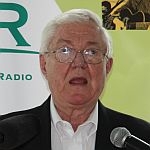Commentator’s Brunch Sampler
 (HOST) All this week, we’ve been hearing a Sampler of recorded excerpts
(HOST) All this week, we’ve been hearing a Sampler of recorded excerpts
from this year’s Commentator Brunch. In response to the theme "Picture
This," commentator Barrie Dunsmore recalled a dramatic and potentially
dangerous moment – that ultimately ended in ambiguity.
(DUNSMORE) I’m Barrie Dunsmore, and this is about "The Anwar Sadat Funeral Mystery."
On
October 7th, 1981, Egyptian President Anwar Sadat was assassinated by a
group of Islamic fundamentalists serving in the Egyptian Armed forces. I
greatly respected Sadat and was personally touched by his murder. Many
times over the years I had met with him – sometimes for formal
interviews, often just for casual chats.
I was covering the
State Department at the time he was murdered. Because of security
concerns it was decided President Reagan would not attend the funeral
but a unique American delegation was formed – and I was chosen to be one
of three pool reporters that would accompany that delegation to Cairo.
On
October 10th, former Presidents Jimmy Carter, Richard Nixon and Gerald
Ford walked slowly a few feet behind the casket of Anwar Sadat. I was
about twenty, twenty-five paces behind the three presidents, in a line
that included former Secretary of State Henry Kissinger and then Israeli
Prime Minister Menachem Begin.
Suddenly members of the Egyptian
Presidential Guard stepped in front of the Kissinger/Begin line,
forcing us all to stop. The guards un-slung their rifles and assumed the
high ready position – that’s barrels pointed slightly upwards and
directly toward us. Immediately, American and Israeli security agents
tensed up and began barking into their radios.
Picture this:
Less than seventy two hours before, another Egyptian military unit had
killed Sadat because he had dared to make peace with Israel . Now the
Prime Minister of Israel and the famous American diplomat who had helped
bring about that peace were virtually in their gun sights – not to
mention numerous other notables and yours truly. For a few moments,
probably no more than thirty seconds, I truly thought that my fifteen
years of reporting on the Middle East was about to come to a very
dramatic end.
But just as suddenly as they had blocked our
passage, the guards re-slung their rifles to their shoulders, moved to
the side and allowed us to continue. None of the officials or the
security people I spoke to then or since knew what had happened. There
were theories but no explanations. Now, it could be that the guards were
simply trying to control the speed of the procession. Perhaps. But it’s
hard to escape the suspicion that the real story might have had a much
more ominous ending.